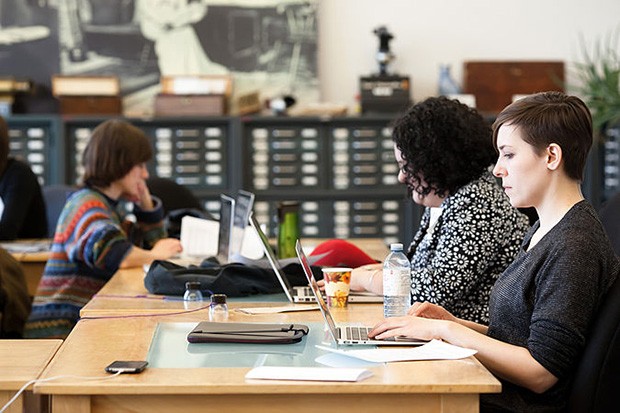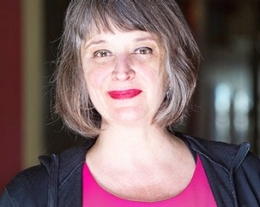Kim Sawchuk, associate dean of Research and Graduate Studies for the Faculty of Arts and Science, has enlisted the help of Communication Studies students — including post-doctoral fellow Maude Gauthier — to help increase the Wikipedia profile of research from Concordia and, more generally, French research from Quebec.
She believes that it’s crucial for ideas with the potential to create change to be put out in new forms and formats. “It is admitting the compelling presence of the internet as a resource for research and pedagogy. It’s also, as pedagogues and public intellectuals, thinking of it as a part of our practice.”
But Sawchuk has found that Wikipedia’s editing practices can be problematic.
“It has been fascinating to see how wiki logic can be used to actually deny the relevancy and existence of an organization,” she says. “You need to be written about by someone else at least twice. So organizations that are doing great work outside of the mainstream are less real than, say, Mickey Mouse.”
One of the goals of Sawchuk's large-scale research project Ageing, Communication, Technologies (ACT): Experiencing a Digital World in Later Life is to include more perspectives on ageing in Wikipedia in English and French. But when Gauthier tried to add a new page about the Centre for Women, Ageing and Media (WAM), a partner on the ACT project, it was nominated for deletion.
"From what we can tell, there are a number of 'men's movement' cyber-vigilantes, mostly working in the English-language version of Wikipedia, who search for new references on women, which they scrutinize and find reasons to delete," Sawchuk says.
In the case of WAM, the Wikipedia editors claimed the references were not good enough to attest to the notability of the centre. “What they want are multiple mentions in the media," says Gauthier. She had more success adding pages in French or on concepts related to Sawchuk’s large-scale research project, such as a page on activist ageing.
“When you write about more conceptual stuff, it’s easier to have Wikipedia accept your sources because they are traditional academic references,” Gauthier says.
Marie-Pierre Aubé, director of the Records Management and Archives Department, is also familiar with Wikipedia’s strict regulations.
“We’ve been told that we’re not a reliable source of information about Concordia, which is pretty discouraging,” says the archivist, whose job is to preserve the university’s history.
Aubé and her team monitor Concordia’s institutional entries and update key pages like the profiles of new honorands. There’s also a plan in the works to add important Concordia events to Wikipedia.
“When we find facts that aren’t accurate, we correct them,” she says.
Is feminism the future of Wikipedia?
It’s estimated that only between 8.5 and 16 per cent of Wikipedia’s editors are women. Wikimedia, the non-profit organization responsible for the site, acknowledges the problem and is supporting efforts to tackle it.
Art+Feminism is an international campaign to “improve coverage of women and the arts on Wikipedia, and to encourage female editorship.” Amber Berson, a graduate from Concordia’s masters program in Art History, recently co-organized the second annual Art+Feminism edit-a-thon in Montreal.
It was one of more than 75 events to promote female editorship that took place simultaneously around the world on International Women’s Day weekend (March 7 to 8).
Berson and her colleagues Kathryn Simpson chose to hold the edit-a-thon at Concordia because it is also home to the Canadian Women Artists History Initiative (CWAHI), which documents women artists in the per-World War II period.
“Very few of these artists have a Wikipedia presence,” Berson says. Some 30 aspiring and experienced editors showed up for the bilingual event, which included training and a roundtable about gendered exclusion on Wikipedia.
Berson noted a real desire among researchers to engage with the site.
“Not everybody who showed up was interested in art,” she says. “Many people came because they were scientists or linguists and they wanted to do similar projects in their own field — increasing female content, and creating more feminist content.”
In Berson’s opinion, everyone should become a Wikipedian. “The fact that it's open source and publicly driven is just fantastic,” she says. “It's very open to experimentation.”
Sawchuk concurs.
“If undergrads are going to use Wikipedia as their go-to place, then I want the ideas to be well researched, and to be as accurate as possible,” she says. “I also want a variety of voices and perspectives to be present in that world formerly known as cyberspace.”
The Concordia Libraries’ inaugural Wikipedia Workshop takes place from 2 to 4 p.m. on Tuesday, May 12 in Room LB-203 of the J. W. McConnell (LB) Building (1400 De Maisonneuve W.) on the Sir George Williams Campus.


 The Montreal edition of the Art+Feminism Wikipedia edit-a-thon took place in the Documentation Centre of the Canadian Women Artists History Initiative (CWAHI) at Concordia. | Photo by Emily Gan
The Montreal edition of the Art+Feminism Wikipedia edit-a-thon took place in the Documentation Centre of the Canadian Women Artists History Initiative (CWAHI) at Concordia. | Photo by Emily Gan
 Academic Kim Sawchuk: “I want the ideas on Wikipedia to be well researched, and to be as accurate as possible.”
Academic Kim Sawchuk: “I want the ideas on Wikipedia to be well researched, and to be as accurate as possible.”